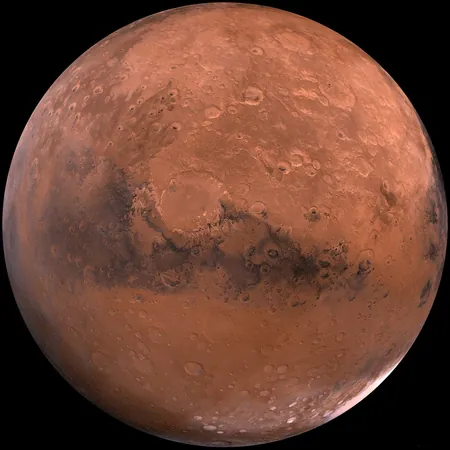
Transforming Life on Mars: The Role of Synthetic Biology in Space Colonization
2025-04-01
Author: Sophie
Introduction
In recent years, synthetic biology has emerged as a groundbreaking field in science, poised to revolutionize our understanding of biology and its applications. From creating genetically modified golden rice that fights vitamin A deficiency to the monumental advancements from the Human Genome Project, synthetic biology can reshape our future. Experts in biotechnology are hailing it as a cornerstone for the next wave of innovation, with implications reaching far beyond Earth.
What is Synthetic Biology?
At its core, synthetic biology involves the design and alteration of organisms using genetic engineering and advanced biotechnological techniques. British biologist Jamie A. Davies aptly describes it as "the creation of new living systems by design." What’s even more exciting is the possibility of leveraging these techniques for space exploration, particularly in endeavors aimed at making Mars habitable for human life.
Addressing Environmental Challenges on Mars
One of the most exciting aspects of this pursuit is the ability of synthetic biology to help us manage one of Mars's significant challenges: its harsh environment. With the innovative tools available today, such as the Nobel Prize-winning CRISPR Cas9 gene-editing technology, researchers can now edit genes with remarkable precision and efficiency. This capability opens up unprecedented opportunities for exploring and potentially colonizing the Martian surface.
Microbial Solutions for Mars's Soil
A particularly intriguing approach is using microbes to detoxify and make the Martian soil more supportive of life. Many extremophiles—microorganisms that thrive in conditions considered hostile to most life on Earth—can survive high radiation levels and extreme temperatures. Studies of organisms like tardigrades, known for their resilience in the vacuum of space, provide valuable insights into how we can engineer microbes capable of withstanding Martian conditions. Such engineered microbes could detoxify perchlorates present in Martian soil that are toxic to humans and might even pave the way for sustainable agriculture.
Engineering Mars's Atmosphere
Further, consider the ancient cyanobacteria that once thrived on our planet, enriching Earth's atmosphere with oxygen. By employing synthetic biology, we could engineer microorganisms to perform similar functions on Mars, transforming its carbon dioxide-rich atmosphere into a more breathable one. This concept hinges on our ability to manipulate these tiny lifeforms to survive and thrive in Martian conditions, effectively enhancing the atmospheric quality through biological processes.
Terraforming Mars with Synthetic Biology
Moreover, the dream of terraforming Mars—transforming it into a more Earth-like environment—has captivated scientists for decades. While traditional methods like using space mirrors to create a greenhouse effect could take centuries, synthetic biology offers a more immediate alternative. By engineering microbes capable of regulating greenhouse gases and converting toxic substances into less harmful forms, we could accelerate the process of making Mars hospitable.
Ethical Considerations
However, with great power comes great responsibility. The ethical implications of introducing engineered lifeforms into new ecosystems must be carefully considered. As we explore these possibilities, we must engage in deep discussions about the long-term consequences of seeding new life on Mars and the broader implications for our solar system.
Future Prospects
Recent research from Macquarie University in Sydney emphasizes the potential of synthetic biology to enhance plant-based food production on Mars, proposing the development of multi-biofortified crops that are nutritionally improved and have extended shelf-lives. As we look toward the future, the capabilities of synthetic biology could prove to be the key driver in enabling humanity to thrive not just on Earth but across the cosmos.
Conclusion
As we stand on the brink of becoming an interplanetary species, the fusion of synthetic biology and space exploration may very well be the technology that defines our future. The race to Mars is on, and synthetic biology could be our secret weapon in this monumental challenge.









 Brasil (PT)
Brasil (PT)
 Canada (EN)
Canada (EN)
 Chile (ES)
Chile (ES)
 Česko (CS)
Česko (CS)
 대한민국 (KO)
대한민국 (KO)
 España (ES)
España (ES)
 France (FR)
France (FR)
 Hong Kong (EN)
Hong Kong (EN)
 Italia (IT)
Italia (IT)
 日本 (JA)
日本 (JA)
 Magyarország (HU)
Magyarország (HU)
 Norge (NO)
Norge (NO)
 Polska (PL)
Polska (PL)
 Schweiz (DE)
Schweiz (DE)
 Singapore (EN)
Singapore (EN)
 Sverige (SV)
Sverige (SV)
 Suomi (FI)
Suomi (FI)
 Türkiye (TR)
Türkiye (TR)
 الإمارات العربية المتحدة (AR)
الإمارات العربية المتحدة (AR)